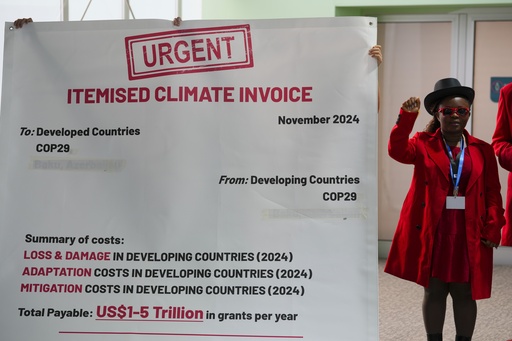
BAKU, Azerbaijan — In a bid to address climate change challenges, wealthier nations are investigating financial leverage that could provide the much-needed resources for poorer countries. This financial leverage involves a blend of grants, loans, and private investments and is becoming a central theme at the ongoing United Nations climate conference, COP29.
However, representatives from developing countries express concern that they may be left with insufficient funding and an increased debt burden. The critical issue at the forefront of discussions in Baku is the amount of financial aid that will be extended to assist developing nations in transitioning to cleaner energy sources, adapting to climate change realities, and responding to natural disasters exacerbated by climate factors. Currently, the target of $100 billion annually, set in 2009, is under review to establish a more relevant figure.
While experts assess the necessary funding to be closer to $1 trillion, developing nations have estimated their needs at around $1.3 trillion for climate financing. Negotiators are exploring both the types of financial resources available and the amounts to be allocated. According to Avinash Persaud, a climate advisor for the Inter-American Development Bank, developed nations currently have aid budgets totaling $200 billion, positioning them as key contributors to this global financial initiative.
The disparity between $200 billion and $1.3 trillion is stark, but advocates believe that the “power of leverage” could make a significant difference. Persaud explains that contributions to multilateral development banks can be maximized— for every dollar assigned to such a bank, it could potentially catalyze up to $16 in spending toward facilitating a transition away from fossil fuels. He added that while the results for adapting to climate change are less impressive, yielding about $6 for every dollar, it nonetheless reflects a strategic pathway forward.
World Bank leadership indicated that collective efforts among multinational development banks could result in $125 billion allocated to climate loans, which could serve as a foundation for further investments, as per several climate economics experts. Melanie Robinson, the global climate economics and finance director at the World Resources Institute, highlighted the substantial impact this leverage could have on climate funding efforts.
Conversely, when it comes to reparation for countries already suffering from climate impacts—like Caribbean nations hit by devastating hurricanes—this leveraged funding model falls short. In such cases, direct grants may be more beneficial, according to Persaud.
The prospect of financing primarily through loans raises significant concerns for developing nations, which are already grappling with heavy debt burdens. Michai Robertson, a climate finance negotiator for the Alliance of Small Island States, warns that relying on loans for compensation means perpetuating a cycle of debt for vulnerable nations. Furthermore, he underscores that the promised leveraged financing often fails to materialize as expected.
Robertson remarked, “All of these things are just clever ways of saying more debt,” questioning whether the response to the climate crisis should lead to unsustainable financial obligations for those least responsible for the situation. He contended that the bulk of the requested $1.3 trillion should come in the form of grants or long-term loans with minimal interest, rather than heavily leveraged loans, which he argued should only comprise around $400 billion of the total.
Experts have proposed alternative funding strategies to generate climate finance, such as imposing taxes on international shipping, aviation, or leveraging wealth from billionaires. While politically challenging, there is recognition that developing effective financial resources for climate action is essential, according to Inger Andersen, Director of the United Nations Environment Programme, who advocates for a mix of loans, grants, and debt relief in addressing the funding gap.
Andersen expressed concern over the unsustainable debt situation many nations face, emphasizing the urgency for cooperative action among finance and climate ministers to devise viable solutions. “Climate change is an immediate challenge affecting all nations; no one is exempt from its consequences,” she stated. The financial demands to effectively respond are on the rise and must be addressed with determination and innovation.
